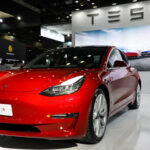Huawei will keep leading position in global 5G
The UK’s move to ban Huawei from participating in its next-generation network construction will affect the Chinese company’s market share in the country, but it won’t shake Huawei’s leading position in the global 5G industrial chain, based on its accumulated technologies and services, analysts said.
“We remain confident that the new US restrictions would not have affected the resilience or security of the products we supply to the UK,” Huawei said in a statement sent to the Global Times following the UK’s announcement.
The UK’s mobile providers are banned from buying new Huawei 5G equipment after December 31, and they must also remove all of the Chinese firm’s 5G equipment from their networks by 2027, the UK government said on Tuesday, according to a BBC report.
Huang Haifeng, an independent observer of the high-technology sector, told the Global Times on Wednesday that from the perspective of supply and the industrial chain, the ban will have a limited impact on Huawei since there are few patents or core items provided by the UK market.
“The vast majority of Huawei’s 5G equipment production is now based in China,” said Huang.
For chip supply, in particular chip manufacturing, which is the focal point of the US threat to Huawei’s 5G equipment, the Chinese technology giant has realized self-sufficiency and localization of supplies, Huang noted.
Huawei can basically realize ‘de-Americanization’ this year for both base station equipment and smartphones, analysts said.
Richard Yu Chengdong, chief executive of the company’s consumer business group, said in April that Huawei had the option not to use US components in its smartphones but wanted to maintain good relationships with its US suppliers.
The US government has extended licenses several times that allow US companies to continue doing business with Huawei, since the Chinese company was put on a blacklist by the US in May 2019.
It seems that Huawei’s forced retreat from the UK market will be a boon for its European rivals in terms of grabbing market share, but in reality it’s not a good sign for the development of the 5G wireless sector, analysts warned.
Finnish telecom gear maker Nokia said Tuesday that it is ready to replace Huawei’s 5G after the UK’s decision to stop using the Chinese manufacturer, according to Reuters.
Ericsson had no comment when contacted by the Global Times on Wednesday.
Xiang Ligang, director-general of the Beijing-based Information Consumption Alliance, told the Global Times on Wednesday that as a leading innovator in 5G technologies and standard setting, Huawei’s absence from the UK market won’t be good for its sound development.
“That’s something that the two EU competitors should also wish to avoid when it comes to promoting the technology and services.”
The UK government’s unwise decision on Huawei is also a headache for its local operators due the large potential losses they will face.
The CEO of British telecoms company BT has warned it may take a decade to remove Huawei equipment from Britain’s wireless infrastructure, according to the BBC. The Chinese technology giant has been in the nation’s telecoms infrastructure for two decades and has been a big supplier to the industry, the CEO said.
Two-thirds of BT’s networks are currently provided by Huawei with one-third from Nokia, according to media reports.
Xiang said that the temporary setback would not hinder Huawei’s efforts in the next-generation wireless technology.
According to a Reuters report in May, the US government will allow its companies to work with Huawei on setting standards for next-generation 5G networks.
An analysis from market research consultancy Strategy Analytics in March showed Huawei was the top contributor to 5G standards drawn up by 3GPP, the international industry organization that governs cellular standards.
The consultancy’s report in 2019 forecast that by 2023, Huawei would remain the No.1 global 5G radio access network vendor with a 24.8-percent market share ahead of Ericsson (22.9 percent) and Nokia (22.7 percent).
Huawei File photo:VCG


